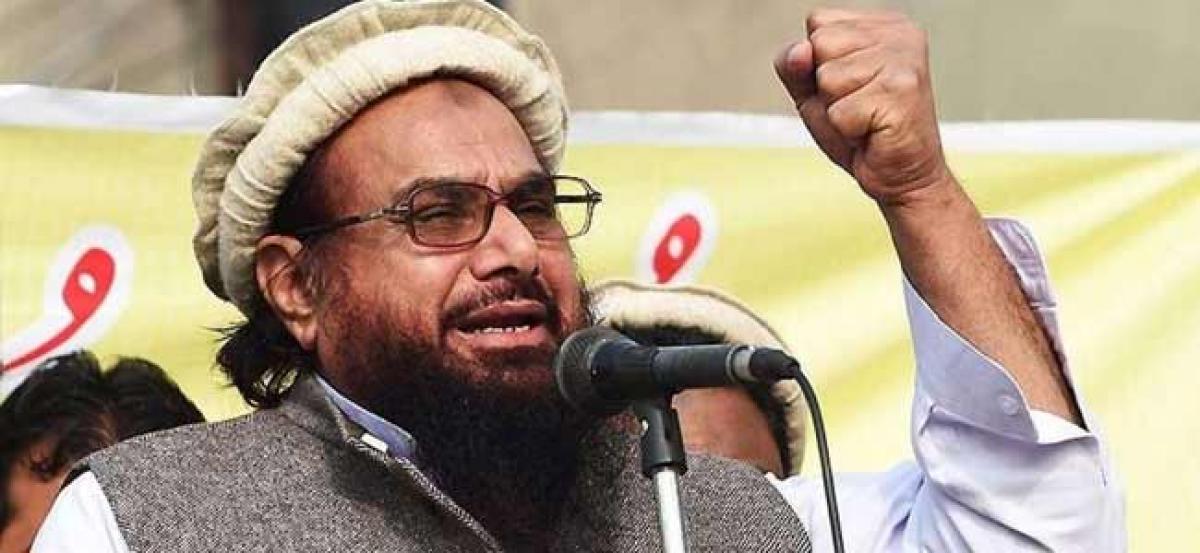Live
- Mohan Babu Questions Media Ethics in Emotional Audio Message
- Chandrababu Congratulates Gukesh on Historic Chess Achievement
- How Long Can You Safely Wear Makeup?
- ED conducts raids at two places in Bengal in chit fund case
- BJP Tamil Nadu President Expresses Confidence In Resolving Tungsten Mining Concerns In Madurai
- Karnataka Reviews Lake Safety Ahead of Monsoon: Minister Bhosaraju Tells Upper House
- Udupi MP’s queries, More key highways on high-priority
- Investing in Skills: Education Loans Paving the Way for Career Success
- Ghaggar river’s two stretches identified as polluted: Govt
- ICC chief Jay Shah meets Brisbane 2032 Olympics organising committee CEO
Just In

Under immense global pressure, Pakistan has finally declared Hafiz Saeed as a terrorist. However, it was done with much discretion. In a quiet move away from media glare,
Under immense global pressure, Pakistan has finally declared Hafiz Saeed as a terrorist. However, it was done with much discretion. In a quiet move away from media glare, Pakistan President Mamnoon Hussain on Monday signed an ordinance that roughly made Saeed a terrorist in the country. The new ordinance is aimed at cracking down on terrorist organisations and its individuals, which have been banned by United Nations Security Council (UNSC), according to sources.
According to the ordinance, it amends a section of the Anti-Terrorism Act (ATA), enabling the authorities to take action against the UNSC-proscribed individuals and terror outfits such as sealing their offices and freezing their bank accounts, the Express Tribune reported.
The sources in the National Counter Terrorism Authority (NACTA) confirmed the new move, saying the ministries of Interior, Finance and Foreign Affairs, as well as NACTA's Counter Financing of Terrorism (CFT) wing were working on the matter.
A spokesperson for President Hussain refused to share further details on the ordinance, saying the defence ministry was the notifying authority.
According to sources, the authorities are bound under international obligations and have sweeping powers to take legal actions against the terrorist organisations under the framework of the Financial Action Task Force (FATF), which is an international body that cracks down on money laundering and terrorist financing.
The UNSC sanctions' list includes dreaded terrorist organisations such as al-Qaeda, Tehreek-e-Taliban Pakistan (TTP), Lashkar-e-Jhangvi (LeJ), Jamaat-ud-Dawa (JuD), Falah-e-Insaniat Foundation (FIF) and Lashkar-e-Taiba (LeT) to name a few.
The LeT, which is responsible for numerous terror attacks in India, was declared "banned" under the UNSC resolution 1267 in 2005.
In December last year, the Pakistan Government had planned to take over two charities belonging to Hafiz Saeed, the 26/11 Mumbai attacks mastermind, the JuD and the FIF. An action plan was supposed to be submitted by the government, regarding this move.
In the NACTA website, the JuD and the FIF are on the ?watch list? category.
The United States' Department in 2014 had named the JuD as ?foreign terrorist organisation?, a status that freezes assets of the organisation under its jurisdiction.
Saeed, who had recently been released from house arrest, is also looking to contest the 2018 general elections in Pakistan and has, thereby, formed a party by the name of Milli Muslim League (MML).
Pakistan prohibited the JuD and FIF from collecting donations from individuals and companies last month.
India has, time and again, protested against Pakistan for harbouring Saeed, who is wanted for plotting the 2008 attack.

© 2024 Hyderabad Media House Limited/The Hans India. All rights reserved. Powered by hocalwire.com







